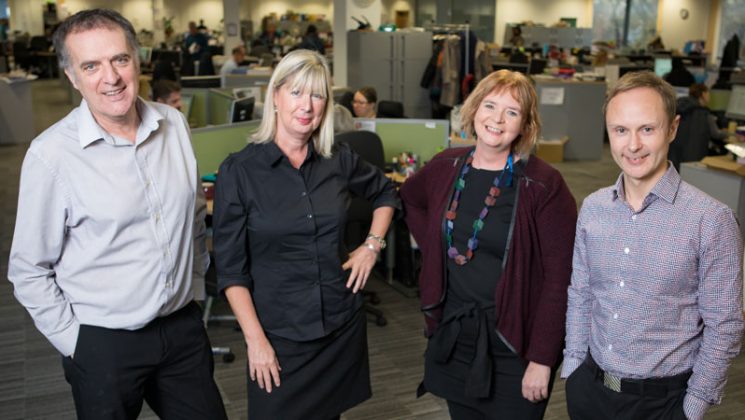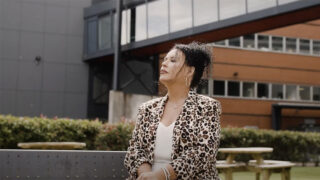Left to right: Mike Gunnery, Joy Dunbavin, Paula Duffy and Glyn Slack. Photo: Dave Thompson
Missed appointments, bad teeth and visible hunger are some of the signs a child is being neglected. When this happens, social services steps in and a whole range of professionals work hard to get the child’s life – and that of their family’s – back on track. That process will often involve fostering, and finding the right person to look after a child in their most vulnerable hour is no easy task.
At the last count, there were 51,805 children in foster placements in England. Every one of those children needs an approved, trained and compassionate foster carer to support them. So, on any given day, teams of local government staff are working hard to make sure they have enough foster carers to look after the children in their area.
Paula Duffy is the recruitment and engagement officer for fostering at Manchester City Council. Her job is to reach those people who would make good foster carers, which she does through events with local communities, at libraries and other venues.
One of the things Paula does regularly is challenge assumptions people have about fostering. “There is a mystery that surrounds fostering a bit,” she says. “People think they have to be in a relationship, or they have to own their own home, or they can’t be gay, or they have to be a certain age.” Paula’s job is to reassure people that these things aren’t the case. There is a minimum age, of course (it’s 21), but Paula’s oldest foster carer is 70 years old.
Fighting stereotypes
So, what makes a good foster carer? “There’s no average one. When you get them all in a room they’re all different colours, different ages,” Paula says.
There are certain professions that seem to unite them, though. “Nurses, midwives, doctors, teachers, teaching assistants, people who have got that kind of social conscious and want to make a difference.” They’re often people who have a kind heart, but don’t think of themselves as anything special, she says.
Sadly, it isn’t just stereotypes about who can foster that Paula comes up against. It’s also stereotypes about children. The ones they find hardest to place are boys over 10, because people have preconceived ideas about how they will behave.
Paula says it’s understandable, but actually, “We find that a lot of our young people are very quiet. They’ve learned not to make a noise, because something could happen. Sometimes they can be quite withdrawn.”
Paula explains that fostering is not a one-size-fits-all type of job. “Before I did this I didn’t realise the breadth of it.” There are short-term fosterers and long-term. Short term can be anything from a weekend to two years, and during those two years the plan may be for the child to return home, or it may be that they’ll then move to a permanent foster carer.
Short-term foster carers may do one weekend a month, and look after a child with a life-limiting illness. Or they might be emergency foster carers, who look after a child on a Saturday night because they’ve run away, before social workers find a placement for them on the Monday.
Permanent fosterers tend to take care of children who are eight or older, who are ‘too old for adoption’. “That’s not how we see it,” says Paula, “but people tend to want to adopt younger children.” With permanent fostering, the aim is for the child to stay until they’re 18.
The joy comes from placing children and seeing it work. It’s about providing a service for children
Then there is supported lodging, for children who have probably been in permanent foster care, get to around 16 or 17 and want to spread their wings, but are not yet very independent, so they go to live with a supported lodgings carer. They have an auntie or uncle kind of role, Paula says, “passing on all your life skills, cooking, things like that”.
So, once Paula has done her job and piqued a potential foster carer’s interest, some of her colleagues step in. The team at Manchester then has to talk to them about the job, make sure they understand what it means and that they’re going to make good carers.
Glyn Slack has been a social worker for 17 years. When someone is interested in being a fosterer, Glyn is one of the people making sure they receive the right information and that they’re asked the right questions. He will then visit them in their home. “It’s about making sure they’ve got things in place, and a life that’s good for the child.”
Next, if they seem a good fit, they’ll be brought on a ‘skills for fostering’ course, which they do with other adults interested in being fosterers. “Lots of people come to us with an idea of what fostering is, but not in much detail,” Glyn says. “I try and fill them in when I go to their house, but they really learn about it when they’re with other people and asking different questions. It’s really nice because people can bounce off each other, figuring out what the task is, and learning about what our children have been through.”
The last resort
Glyn’s colleague Mike Gunnery also works hard to get to know potential foster carers. “You talk to people about their skills and knowledge, you get to know people very well. You’re talking about very, very personal things, so you do form quite close relationships with them.”
Once the potential carers have gone through training, the final stage is being approved by a panel, and then they are eligible to have children placed with them. For Mike, “the joy comes from placing children and seeing it work. It’s about providing a service for children.”
Overseeing this whole process, and the fostering team, is Joy Dunbavin.
Joy started out in social work at 22 years old, and has now been doing it for 30 years. As the team leader, she offers a broader perspective on social work today: “You need to be thick-skinned to be a social worker,” she says.
For Joy, “it isn’t that parents don’t always love children, but they’re not giving them the care that a child needs. I’ve got a view that people often want to be the best they can and be the best parents, but sometimes a violent partner, a lack of money, mental ill-health or drug or alcohol dependencies stop them parenting the way they need to. It doesn’t mean that they don’t love the children.”
Joy stresses that removing a child from the family home is always the last resort. Nevertheless, their role means they’re not thanked in the same way teachers or NHS staff are. Does it get to them? “If you are making decisions where you may have to remove a child from a family, then you are not going to be very popular. That is inevitable,” Joy says.
She makes sure her team acknowledges every success, because, ultimately, “You’ve just got to focus on the child.”






